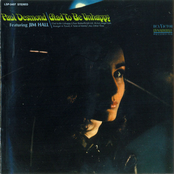Glad to Be Unhappy

Biography
The bittersweet pleasures of sorrow in love are among the oldest inspirations in music. Whole unionsful of musicians from Vienna, Budapest and any place a gypsy's bow has touched an E-string have understood and nurtured this phenomenon. The American version of this venerable tradition of Liebschmerz is, of course, the torch song. Rodgers and Hart summed it up a generation ago with our title song, Glad to Be Unhappy. While Paul Desmond's alto sax is hardly the American version of European schmal...
The bittersweet pleasures of sorrow in love are among the oldest inspirations in music. Whole unionsful of musicians from Vienna, Budapest and any place a gypsy's bow has touched an E-string have understood and nurtured this phenomenon. The American version of this venerable tradition of Liebschmerz is, of course, the torch song. Rodgers and Hart summed it up a generation ago with our title song, Glad to Be Unhappy. While Paul Desmond's alto sax is hardly the American version of European schmaltz, it is an ideal catalyst for the strange combination of being in love and feeling sad. There are few instruments of emotional expression more effective than Paul's saxophone, and this collection of love songs brings out the romantic side of his horn. Not all the selections are torch songs per se, but all are richly melodic without being cloying. They range from the frankly sentimental Poor Butterfly to Paul's own "smiling through", tight-lippedly jaunty Any Other Time. Assisting Paul in this album is a group of cohorts familiar to past purchasers (may their tribe increase!) of Desmond albums: guitarist Jim Hall, bassists Gene Wright and Gene Cherico, and drummer Connie Kay. lnobtrusive good taste and impeccable musicianship are what they stand for. Their ensemble unity is exceptional; in particular, the front line of Desmond and Hall truly thinks as one. Some of the improvised exchanges between them sound like carefully planned arrangements, though played with the same deceptive ease that makes some of the arranged portions sound like casual improvisations. Jim Hall's solos, his tasteful accompaniments to Paul, and his seemingly inexhaustible supply of beautiful introductions are exceptional even for a musician of his past accomplishments. Just take Angel Eyes as an example; it can serve forever as a short course for guitarists in every aspect of the instrument's role in an improvising combo. For an album with a theme which could wear out quickly in inexpert hands, this one leaves you wanting more. Part of the effect is the choice of repertoire; it is as unhackneyed as it is varied, with changes of tempo which include two waltzes of very different kinds. But mostly it is the haunting beauty of Paul's saxophone and Jim's guitar, spinning in a new way these emotionally charged songs, telling of love with a lump in the heart. They create a peaceful carpet on which one can float and reflect on whatever aspect of the opposite sex happens to be uppermost in mind at the moment. Something along this line is uppermost in most minds most of the time, so the universality of this album is about as complete as you can get. George Avakian (original liner notes, 1965) Read more on Last.fm. User-contributed text is available under the Creative Commons By-SA License; additional terms may apply.
